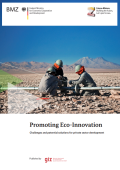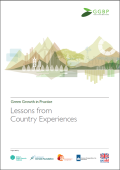Uncertainty about the future is an important determinant of well-being, especially in developing countries where financial markets and other market failures result in ineffective insurance mechanisms. However, separating the effects of future uncertainty from realised events, and then measuring the impact of uncertainty on utility, presents a number of empirical challenges. This paper aims to address these issues and provides supporting evidence to show that increased climate variability (a proxy for future income uncertainty) reduces farmers’ subjective well-being, consistent with the theory of optimal expectations (Brunnermeier & Parker, 2005 AER), using panel data from rural Ethiopia and a new data set containing daily atmospheric parameters. The magnitude of our result indicates that a one standard deviation (7%) increase in climate variability has an equivalent effect on life satisfaction to a two standard deviation (1-2%) decrease in consumption. This effect is one of the largest determinants of life satisfaction in rural Ethiopia.
This report recommends actions by the public and private sectors to foster the growing market for SMEs in the clean technology sector.
Acknowledging the environmental and economic potential of green entrepreneurship, and recognizing the daunting challenges clean technology SMEs are facing, particularly in accessing early and growth stage financing, the report provides policymakers with a range of practical instruments that help support SMEs in clean technology sectors such as innovative finance, entrepreneurship and business acceleration, market development, technology development, and the legal and regulatory framework. These policy considerations are illustrated through case studies of national programs in South Korea, India, Thailand, and Ethiopia.
The report also highlights clean technology market opportunities that can have large social impact and the benefit of promoting clean technology jobs.

This paper, Promoting Eco-Innovation: Challenges and potential solutions for private sector development, begins with an exploration, in Chapter 1, of how eco-innovation is addressed in the current international debate. This refers mainly to the climate change negotiations and the recent Rio+20 conference. Chapter 2 then provides a working definition of eco-innovation and examines how it fits with the requirements of private sector development. Chapter 3 contains an overview of the general conditions under which eco-innovations are generated in developing countries, including both the supply side and the demand side. Chapter 4 discusses possible approaches in the context of German development cooperation, and asks which instruments can be used to foster new innovations and encourage their rapid dissemination.
The report includes case studies on the African continent, Egypt, Ethiopia, Germany, and India.
This report summarises the outcomes of the joint AfDB-OECD workshop, titled Enabling Green Growth in Africa, hosted by the Government of Zambia in Lusaka on January 15-16, 2013 and another two-day workshop on Strategic Environmental Assessments (SEA) and Green Economy that follows, organised by the OECD DAC SEA Task Team. The objective of the workshops was to facilitate an exchange of perspectives between regional member countries (RMCs) and development partners; and to explore the rationale and enabling environment for green growth in Africa through, notably, the sharing of country experiences. The report highlights how the outcomes of the two workshops will inform current and future green growth work in both organisations.

Green growth is becoming an attractive opportunity for countries around the world to achieve poverty reduction, environmental protection, resource efficiency and economic growth in an integrated way. Green growth strategies generate policies and programs that deliver these goals simultaneously. They accelerate investment in resource efficient technologies and new industries, while managing costs and risks to domestic taxpayers, businesses, communities and consumers.
This report carried out by the Green Growth Best Practice (GGBP) initiative, is the first comprehensive international assessment of lessons from experiences of pursuing green growth across all levels of government and all regions. The report is the result of a collaborative partnership between the Climate & Development Knowledge Network (CDKN), the European Climate Foundation (ECF) and the Global Green Growth Institute (GGGI). It engaged 75 authors in evaluating more than 60 programs around the world.
